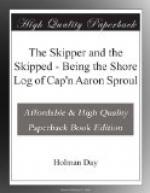“There’s your Todd Ward Brackett. I predicted him! ’Round here to sell ye rotten thread and rusted tinware and his all-fired Balm o’ Joy liniment.”
“It’s good liniment, and I need some more for your toe, Aaron,” pleaded his wife, putting her worsted out of her lap.
“I’ll chop that toe off and use it for cod bait before I’ll cure it by buying any more liniment off’m him,” the Cap’n retorted. “You jest keep your settin’, Louada Murilla. I’ll tend to your fam’ly end after this.”
He struggled up and began to hop toward the end of the piazza. The new arrival had burst into cheery song:
“There was old Hip Huff, who
went by freight
To Newry Corner, in this State.
Packed him in a—”
There was a red van in the yard, its side bearing the legend:
T. Brackett,
Tinware and Yankee notions.
Licensed by C.C.
A brisk, little, round-faced man sat on the high seat, bolt upright in the middle of it, carolling lustily. It was “Balm o’ Joy” Brackett, pursuing his humble vocation and using his familiar method of attracting customers to their doors.
“Shet up that clack!” roared the Cap’n.
“Hillo, hullo, hallah, gallant Captain,” chirped Brackett, imperturbable under the seaman’s glare. “I trust that glory floods your soul and all the world seems gay.” And he went on breathlessly:
“May ev’ry hour of your life seem like a pan of Jersey milk, and may you skim the cream off’m it. Let’s be happy, let’s be gay, trade with me when I come your way. Tinware shines like the new-ris’ sun, twist, braid, needles beat by none; here’s your values, cent by cent, and Balm o’ Joy lin-i-ment. Trade with—”
“Git out o’ this yard!” bawled the Cap’n, in his storm-and-tempest tones. “You crack-brained, rag-and-bone-land-pirate, git off’m my premises! I don’t want your stuff. I’ve bought the last cent’s wu’th of you I’ll ever buy. Git out!”
“The Cap’n isn’t well to-day, Todd,” quavered Mrs. Sproul. Fear prompted her to keep still. But many years of confidential barter of rags for knicknacks had made Todd Brackett seem like “own folks,” as she expressed it. “We won’t trade any to-day,” she added, apologetically.
“Nor we won’t trade ever,” bawled the Cap’n, poising himself on one foot like an angry hawk. “You go ’long out of this yard.”
Without losing his smile—for he had been long accustomed to the taunts and tirades of dissatisfied housewives—the peddler backed his cart around and drove away, crying over his shoulder with great good-humor:
“A merry life and a jolly life is the life for you and me!”
“I’ll make life merry for ye, if ye come into this yard ag’in, you whiffle-headed dog-vane, you!” the Cap’n squalled after him. But Brackett again struck up his roundelay:




